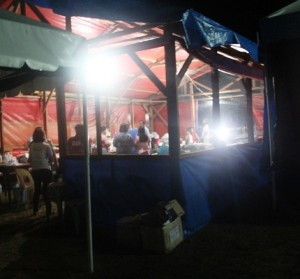
The Department of Social Welfare and Development (DSWD), in coordination with Habitat for Humanity, recently completed the construction of three makeshift hospital tents in Carmen, Loon, and Sagbayan, all in Bohol Province, to immediately address the medical needs of the families affected by the earthquake that hit the province.
The hospital tents are manned by doctors from the district hospitals and municipal health officers.
In addition, hospital tents are also being constructed in the towns of Tubigon, Sagbayan, Clarin, Calape, Buenavista, Inabanga, and Loon.
“Based on the extent of the damage, we are partnering with Habitat for Humanity to provide shelter kits for families with partially destroyed houses, and construct shelters for families with totally damaged houses,” DSWD Secretary Corazon Juliano-Soliman stated.
“The shelter kits are comprised of galvanized iron sheets for roofing, mesh wire, steel bars, and other materials for the repair of partially destroyed houses,” Secretary Soliman added.
According to Vince Delector, Jr., Manager of the Water, Sanitation and Sustainable Operations Team of Habitat for Humanity, some 10,000 shelter kits will be provided while 2,000 core shelters will be built within the next two years.
Delector announced that Habitat for Humanity will start the construction of permanent shelters in Barangay Mantacida in Catigbian, one of the hardest hit areas in Bohol.
“In building the houses, we will use bamboo and cement, encasing the shelters in a lightweight steel frame with a cement foundation,” Delector explained.
Habitat for Humanity has been a long time partner of DSWD in building shelters for victims of disasters, such as Typhoon Sendong which hit Cagayan De Oro in 2011 and Typhoon Pablo which devastated Davao region and Compostela Valley in 2012.
As of October 29, DSWD recorded a total of 17,793 families staying in 371 evacuation centers in Bohol. Based on DSWD’s latest validation report, the number of totally damaged houses in the province rose to 12,672.
Evacuation centers in Cebu have already closed but 1,364 families or 6,806 individuals who are home-based or staying in their relatives’ or friends’ houses continue to receive food assistance from DSWD and local government units. ###


